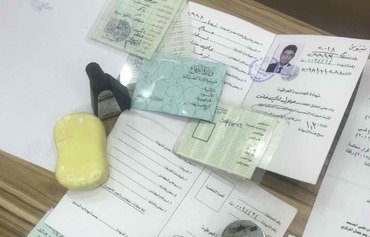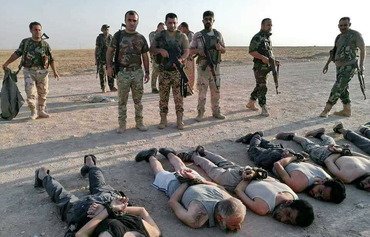Iraqi forces have uncovered documents belonging to the "Islamic State of Iraq and Syria" (ISIS) that represent a significant source of information on the group.
These documents, the latest of which were found June 5th at a weapons cache in Salaheddine province's al-Siniya district, have enabled intelligence officials to apprehend several ISIS elements, strip them of their weapons and thwart their plans.
The documents are from ISIS’s 'Diwan al-Qadaa' (justice administration), the interior ministry said.
During the war on ISIS, Iraqi forces have seized thousands of documents belonging to the group, which have shed light on its structure and activities.
There are two main types of documents, said security analyst Fadel Abu Raghif.
One type are "administrative or organisational documents relating to the infrastructure and formation of the group", he told Diyaruna.
These include information on "al-Kafala", the group's compensation system, lists of names of fighters and their ranks and orders related to stationing, movement, living conditions and holidays, he said.
These documents "give a clear image of the relationship members of the group have with each other and how roles are assigned and the scope of their responsibilities", Abu Raghif said.
"This has led to the dismantling of several dangerous terrorist networks and uncovering hideouts, weapons caches, explosive devices and bomb manufacturing facilities in remote places," he said.
The Iraqi intelligence services are currently reviewing more than 30,000 seized documents of this kind, he said.
Sensitive information
The second type of documents are "highly sensitive and very important and would rarely be left behind by ISIS", Abu Raghif said.
The group would generally burn or dispose of these documents in any way so as to prevent the security forces from getting hold of them, he said.
"These are related to the ISIS top command and their activities, their funding sources and their collaborators, as well as attack plans and other classified information," he said.
"In spite of the group’s extreme caution in how they exchange these documents, several hundred of them were seized by the Iraqi intelligence services during high level operations," he said.
Al-Suqour intelligence unit is now in possession of a detailed database of the group and its remaining capabilities in terms of fighters and weapons, he said.
Understanding ISIS
"Any document that is seized is considered high value and allows us to better understand this intricate web that is called ISIS," said Issam al-Fili, who teaches political sciences at al-Mustansiriya University.
"Information is a central factor in the war, as knowing your enemy from within and how they think and plan their operations leads to victory," he told Diyaruna.
"As for ISIS, we always need to know more about it, since it is a complex group that is able to grow and expand unless it is completely eradicated," he said.
Iraqi forces were able to get hold of many documents after ISIS fled Mosul, said Ninawa provincial council security committee member Hassan Shabib.
These documents have considerably aided the national intelligence effort to hunt down and capture ISIS elements who attempted to blend in with civilians in parts of Mosul, he told Diyaruna.
They also helped security forces "find weapon storage facilities that were professionally hidden in various locations", he said.

![A member of the Iraqi intelligence services uncovers documents that were found in an 'Islamic State of Iraq and Syria' hideout in Mosul. [Photo courtesy of the Military Intelligence Directorate]](/cnmi_di/images/2018/07/05/13297-Iraq-ISIS-documents-600_384.jpg)







ISIS is the result of an ideology that based its pillars on the wrong understanding of Quranic verses and Hadiths which were said of infidels; they instead applied them to Muslims.
Reply2 Comment(s)
Good
Reply2 Comment(s)